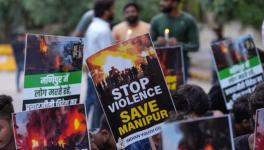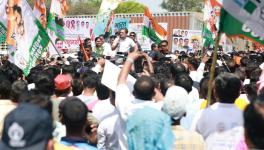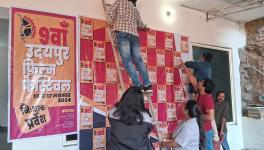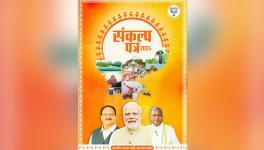India’s Citizenship Law Hurts Transgender People
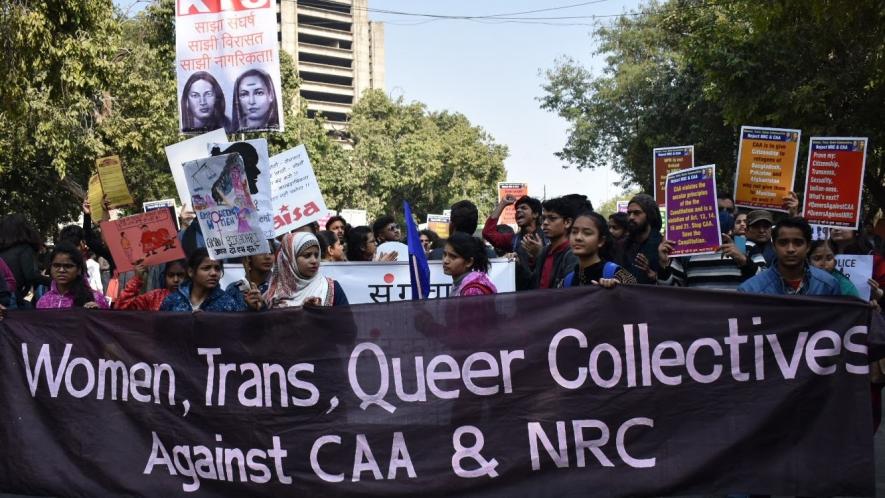
Image for representational use only.Image Courtesy : The Citizen
t’s like a wall is being built, brick by brick, law by law. Its sole aim is to shut out from access to citizenship one of the most vulnerable communities in India, the transgender community.
As a group that feels both hyper visible and invisible at the same time, the community is now under threat as thousands face the possibility of statelessness thanks to the Citizenship Amendment Act (CAA).
The Act, which ignited protests around the country, grants citizenship to people in neighbouring countries – Pakistan, Bangladesh and Afghanistan – who face religious persecution. All except Muslims.
Activists say that while the Act has largely been branded as “anti-Muslim”, it is also anti-minority, with severe consequences for transgender, Dalit (an oppressed social group in the caste system) and Adivasi or indigenous persons.
They warn that this Act, together with the Transgender Persons (Protection of Rights) Act will slowly erode rights for transgender people in India.
A genocidal Act
Bittu, a genderqueer transgender activist and professor of Biology and Psychology at Ashoka University in Delhi, has been protesting against the CAA since day one, when the bill was in its drafting stages.
They say the Act, just like the Transgender Persons Act, is discriminatory in many ways. Not only does it exclude Muslims, but it is also “limited” because it fails to recognise those who are persecuted on the basis of class, caste, gender and sexuality.
It also fails to factor in intersectionality – the idea that people experience multiple forms of oppression. For example, a person may be Muslim and transgender, which means they face a double burden.
The Act, along with the proposed National Register of Citizens (NRC), which aims to document citizenship in India, will have major consequences for transgender persons, says Bittu.
The exclusionary effects have already been experienced by the transgender community in the northeast state of Assam, where the NRC database was first implemented. Activists say there is documented evidence showing that 2 000 transgender people will be left off the database because their gender markers do not match the citizenship list.
“As a trans person, if your legacy documentation doesn’t match, then you’re in trouble. Most trans people have a mismatch of how they look on their documents – like passports and identity documents – and in person,” says Bittu.
Grace Banu, founder of the TransRightsNow Collective, says the introduction of the NRC is “genocidal” for the community. Many transgender people don’t have access to their documentation, because they are forced to flee their transphobic family homes.
“We face discrimination in the family structure and leave our documents with our families. How do we approach our families? Many honour killings have happened within the community. When a person is trans, their family members plan to kill them,” she says.
In some cases transgender people choose suicide as an escape from family violence, she adds.
Zainab Patel, a trangender activist, who was one of the petitioners in the National Legal Services Authority versus Union of India court case on transgender rights, says being both Muslim and transgender can make matters worse.
“My name sounds Muslim. I was born into a Roman-Catholic family. My parents … had no record of my birth but because we belonged to the … church we were issued with a baptism certificate, which worked for school or other institutions.”
Four years ago, Patel had gender-affirming surgery and changed her gender identity on her documentation. But if she had not and was subject to the NRC, it would be difficult to prove her citizenship.
“I was given a male name, a male gender marker and if today I had to show ancestral history and identity – my mother has passed on and my father is disabled and has Alzheimers – so how would I make the link? I would be put into a situation which would exclude me from the records.
“Cisgender people don’t understand this. People think that transgender people have nothing to protest about,” she adds.
Patel also faced additional stigma because of her Muslim name. “When I applied for a new passport, I was asked why I took a Muslim name, which put me on the radar and caused questions to be asked.
“If you look at the Hijra community, a lot of them have Muslim names. So do they go back to their biological name? Do they search for their ancestral history?” Hijras are a social group in India who are officially recognised as a third gender.
Against transgender people
Another act that weighs heavily against transgender rights is the Transgender Persons Act, which was signed into law by the president in December last year, despite protests against it from the community.
Although it has some inclusive elements, the Act largely contradicts the 2014 Supreme Court judgment in the case of National Legal Services Authority (NALSA) versus Union of India, which explicitly recognised the right to self-identification of gender, says Patel.
Instead, the new Act requires transgender persons to go through a formal process of applying to a district magistrate to gain legal recognition of one’s transgender identity and then provide proof of surgery.
Banu says the Act is “poisonous” as it does nothing to protect her community.
“If I want to get a transgender identity card, I have to approach the district magistrate and they have the authority to provide the card to people. We know who our district magistrates are – most of them are cisgender community people,” she says.
Bittu adds that the act forces people to declare their transgender status before anything else, in order to be counted as a citizen in India.
“You are being forced to pass an identity that renders you vulnerable to assault and violence,” they say.
As a consequence of these acts, in particular the fear of having mismatched documentation, many transgender people are afraid to transition, says Bittu.
Anti-minority government
The spirit of these acts are anti-minority and anti-democracy because they were passed into law despite major protest against the bills, says Devina Buckshee, cofounder of the Pink List, an organisation that collects the list of candidates from India’s Lok Sabha (lower house of Parliament), who adopt LGBTQIA+- friendly politics.
She says the agenda of India’s ruling government, the Bharatiya Janata Party (BJP), is no longer hidden.
“Before they cloaked it with ‘development for all’ but now it’s very specific Hindutva [Hindu nationalist] politics.”
Banu adds: “This government is visibly saying that they are against the minority communities – Muslims, Dalits, Adivasis. They are homophobic, transphobic, Islamicphobic and Dalitphobic.”
She says that fighting against “facism and social injustice” is essential for the community.
“We are facing a lot of oppression, we are oppressed in the name of caste, gender, religion and within the LGBTIQA+ community. We are very scared about our future … and also for the younger generation.”
It has been over 100 days of protesting for Bittu, who describes the experience of an uprising in India as “exhausting and exhilarating”.
“We were concerned about whether we would ever be at the stage to collectively fight back. [We] hope it shakes the wider conscience of society”.
Get the latest reports & analysis with people's perspective on Protests, movements & deep analytical videos, discussions of the current affairs in your Telegram app. Subscribe to NewsClick's Telegram channel & get Real-Time updates on stories, as they get published on our website.











